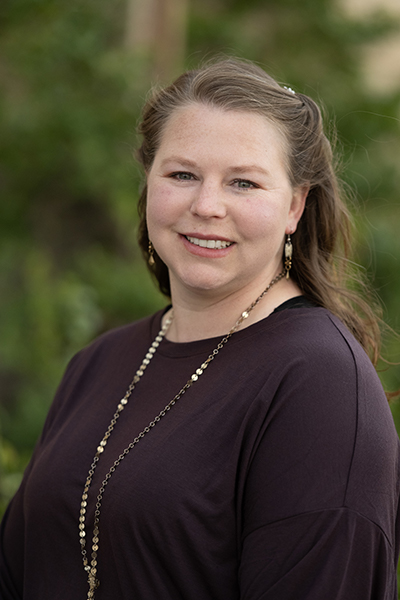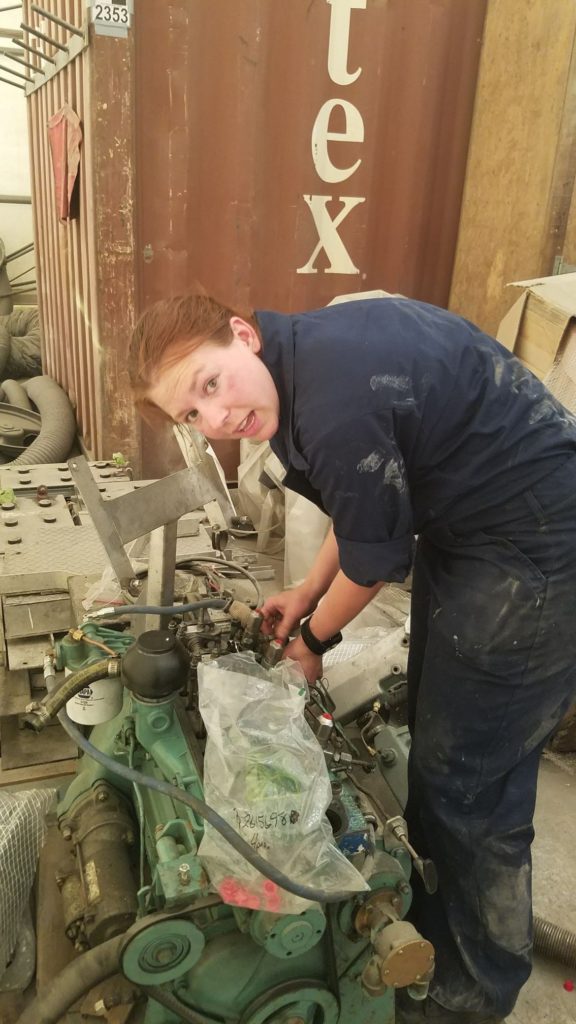
Katy Owens has started over more than once since her graduation from Huntington Beach (California) High School in 2004. From making coffee to joining the Coast Guard at 30 years old and finally to earning an Occupational Therapy graduate degree from Colorado State University, the first-generation college graduate has been a leader most of her life.
“For whatever reason, I have very often in my life been put in leadership positions without really asking,” Owens said. “I got the keys to the bagel shop I worked at when I was 15, as an example. I’ve learned in the 20 years since that leadership is a privilege and a responsibility.”
A slumping economy and a string of management jobs in retail and food service left Owens searching for a new life. She found that in the Coast Guard, where she also became a sexual assault victim advocate. After that, injuries, chronic pain and her experience with occupational therapists sparked a move to CSU’s highly-rated OT program.
“Katy has consistently demonstrated innovative thinking, a hands-on approach to learning, and strong leadership skills throughout her time at CSU OT,” said Julie Silver Seidle, an assistant professor in OT and one of Owens’ nominators for an Outstanding Graduate from the College of Health and Human Sciences. “Katy is always asking the tough but practical questions and has served effectively in multiple leadership positions.”
In their own words
Q. What experiences in your life or at CSU have required you to demonstrate courage?
I have had many opportunities in life to practice courage, and in short, I like to echo Brene Brown: Courage is vulnerability. In this context, I want to address the courage required to start a new life at 30. I was 30 years old when I joined the Coast Guard, because I knew that I had so much more to give than making coffee (and do not get me wrong — the world needs its passionate baristas). Even though I was in the best shape of my life due to 20-plus hours per week of intense martial arts training, plus working only morning shifts at a multi-million dollar earning Starbucks drive thru, the doctor when I arrived at boot camp told me “you’re a little overweight, and at high risk of stress fracture due to your age.” Never mind that I was holding my own with 20-year-old men when it came to pushups, situps, and all the other fun activities involved in our “incentive training.”

Our society spends a lot of time, money and energy telling young women that they are worth little more than their looks, and that by 30 they should be married with two kids and fully “settled down.” This is terrible advice. Before I left for boot camp, and even now, I would tell people that “turning 30 is the best thing I ever did.” So many of the arbitrary rules and expectations just feel so less important. As my time in the Coast Guard ticked by, and my subsequent injuries made it clear that I needed a new career plan, insecurity set it. Was I really good enough to apply to OT school? Little old me, with a theater degree from 2008, who would be 36 at the time of graduation, what could I possibly have to offer in the world of the medical profession? And then I remembered the Marianne Williamson poem, which I was first given by an acting teacher: “we ask ourselves who am I to be brilliant, gorgeous, talented, fabulous? Actually, who are you not to be?” The poem goes on to say that when we let our light shine, we give others the courage to do the same. So that’s what I’m trying to do: through vulnerability, openness and willingness to fail. Shine on.
Q. What was the most rewarding part of your CSU experience?
This is the hardest question here. I think I have to say it’s been going through this crazy grad school experience with the other folks in my cohort. I have learned so much from them, and so enjoyed their stories and their experiences. I wouldn’t be here without them.
Q. What is your advice to incoming students at CSU?
You are enough. Right here, and right now, with all your imperfections, your anxiety, your kindness and your strength. You have always been enough.
Q. How did you become a victim advocate and how did that affect you?
The Sexual Assault Victim Advocate position was a volunteer position that required command endorsement. Sexual harassment and assault is so widespread, and I wanted to have the tools to make a difference in my unit. The training was a five-day initial training, with yearly continuing education requirements that I still maintain. This training was the first time I was able to receive some formal information on trauma informed care, and has helped shape my personal care philosophy and belief that Trauma Informed Care should be the standard of care. Trauma informed care is the notion that as medical practitioners, we should operate as though everyone you meet has a trauma history and do our best to not retraumatize them.
Q. What were your injuries’ effect on your career path?
I have half a dozen bulging/herniated discs throughout my spine with associated nerve involvement. For example, one of the discs impairs the full function of my right hand. I noticed this while working a case with the CG and while attempting to make a bit, which I was famously super-fast at, I could not tell my hand to go any faster. It was like in a dream, when you’re trying to run, but running through jello. So, I have relatively constant nerve and muscle pain through my spine and into my extremities. I also sprained a rotator cuff while bench pressing, and due to hypermobile joints, it’s never returned to full prior function. I remember making a decision about my pain: I could either lay in bed all the time and have a never-ending pity party, or I could go out and do things that at least made me happy in spite of the pain. I think this experience gives me a lot of credibility with my patients. Despite being older, I know I still look young. But being able to disclose my injuries, and my pain, but still be in front of them ready to help, I think is powerful. Pain can take only as much from us as we let it. It’s our job to take it back.
As far as school, my chronic pain and fatigue make it so that I must ration my energy carefully. In OT we talk a lot about the 4 Ps of energy conservation, and I practice them regularly, especially Prioritizing and Pacing. And for me, that means sometimes prioritizing my self-care over schoolwork. But it also releases me from a lot of the ideas of perfectionism I had when I was younger. I just straight up no longer have the time or energy to make sure things are “perfect.” So I have chosen to focus on my graduate school experience and the overall takeaway message rather than getting 100% on everything.
Q. Why did you go for and get the leadership positions you have held?
I think there is a quote about kindness being the rent we pay to live in this world, and I suppose to me it’s similar but with service. I think that’s part of why I joined the military: I know that despite whatever struggles I may think I have, ultimately as a white middle class female I have a lot of privilege, and so my job is to serve. How can I make things better for the people around me? How can I positively contribute to my community? And, it’s also about role-modeling. For whoever is out there looking for someone to look up to, I want to at least be aware of my possible influence.
Outstanding Grads Spring 2022
The Class of 2022 represent the very best of Colorado State University, showing courage in the face of adversity in the pursuit of their degrees. Read more stories of some of the outstanding students who are graduating this spring. read more